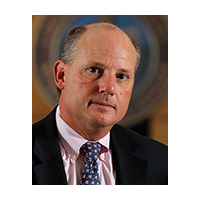Delaware High Court Finds State’s Death Penalty Law Unconstitutional
 Chief Justice Leo E. Strine, Jr. (photo: Harvard Law)
Chief Justice Leo E. Strine, Jr. (photo: Harvard Law)
By Randall Chase, Associated Press
DOVER, Del. (AP) — Delaware's death penalty law is unconstitutional in light of a U.S. Supreme Court ruling earlier this year, the state's high court ruled Tuesday.
In a 148-page opinion (pdf), a majority of Delaware Supreme Court justices said the state law violates the U.S. Constitution because it allows a judge to sentence a person to death independently of a jury's recommendation.
The court said the law is unconstitutional because it allows a judge, independently of the jury, to find the existence of one or more aggravating circumstances weighing in favor of the death penalty, and because it does not require jurors to be unanimous in deciding whether any aggravating circumstances exist. The justices said the law is also flawed because it allows the judge, not the jury, to make the crucial final determination on whether aggravating circumstances outweigh mitigating factors, thus mandating a death sentence. That determination, the court said, must be made unanimously and beyond a reasonable doubt by the jury.
"If the right to a jury means anything, it means the right to have a jury drawn from the community and acting as a proxy for its diverse views and mores, rather than one judge, make the awful decision whether the defendant should live or die," wrote Chief Justice Leo Strine Jr.
Justice Karen Valihura concurred in part with the majority opinion but issued a partial dissent regarding jury unanimity and whether the weighing of aggravating and mitigating circumstances must be done by a jury instead of a judge.
Meanwhile, Justice James Vaughn Jr. dissented in full from his colleagues, noting an important difference between Delaware's law and a similar Florida sentencing scheme that was struck down by the U.S. Supreme Court. Unlike under the Florida law, Vaughn said, a person in Delaware is not eligible for the death penalty until and unless a jury finds unanimously and beyond a reasonable doubt the existence of at least one specific statutory aggravating factor.
"I am satisfied that Delaware's death penalty statute complies with the Sixth Amendment as the law on that amendment is currently interpreted by the U.S. Supreme Court," Vaughn wrote.
The justice agreed, however, that any problematic provision of Delaware's death penalty law cannot be severed from its other provisions so as to allow jury instructions that would comport with federal constitutional standards.
"Because the respective roles of the judge and jury are so complicated ..., we are unable to discern a method by which to parse the statute so as to preserve it," the court said, adding that any decision about reinstating the death penalty should be left to the General Assembly, where attempts by death penalty opponents to abolish capital punishment have repeatedly failed.
Gov. Jack Markell praised Tuesday's court ruling, describing capital punishment as "an instrument of imperfect justice" that does not make society safer.
"While I would have supported abolishing the death penalty legislatively, it is my hope that today's decision will mean that we never see another death sentence in our state," Markell said in a prepared statement.
Santino Ceccotti, a lawyer with the Delaware public defender's office who argued the case before the Supreme Court, said he was pleased with the ruling but noted the state attorney general's office could appeal the decision in federal court. A spokeswoman for the Delaware Department of Justice said in an email that the agency is reviewing the decision.
Ceccotti said it remains to be seen whether the ruling could be applied retroactively to the 13 men currently on Delaware's death row.
"What we know for sure is that the scheme in Delaware is unconstitutional ... and that will have a direct impact on cases that are pending," he said.
Ceccotti said all defendants in cases in which prosecutors are seeking the death penalty will have to be recharged.
"With this decision, capital murder is no longer an option," he said.
To Learn More:
Benjamin Rauf v. State of Delaware (Supreme Court of the State of Delaware) (pdf)
54% Increase in Executions around World; Texas Responsible for Half in U.S. (by Edith M. Lederer, Associated Press)
Alabama Judges Override Juries and Order Death Sentences…if There’s an Election Coming Up (by Danny Biederman and Noel Brinkerhoff, AllGov)
- Top Stories
- Unusual News
- Where is the Money Going?
- Controversies
- U.S. and the World
- Appointments and Resignations
- Latest News
- What If China Invaded the United States?
- Donald Trump Has a Mental Health Problem and It Has a Name
- Trump Goes on Renaming Frenzy
- Trump Deports JD Vance and His Wife
- Trump Offers to Return Alaska to Russia






Comments